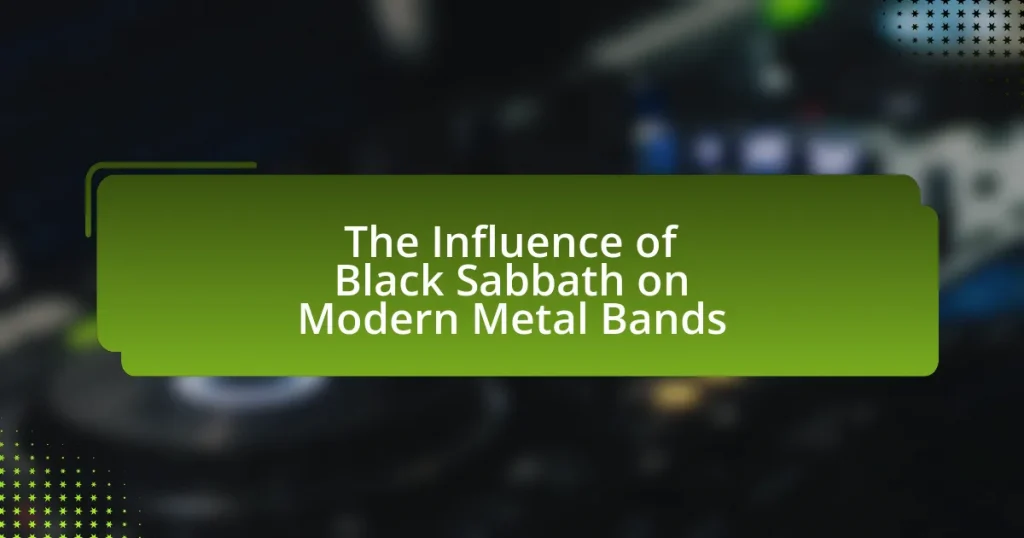The article examines the evolution of metal lyrics, highlighting the transformation of themes and storytelling from the genre’s origins in the late 1960s to contemporary expressions. It discusses how early metal bands like Black Sabbath focused on dark themes, while later groups such as Iron Maiden and Metallica expanded their lyrical content to include historical narratives and personal struggles. The rise of subgenres in the 1990s and 2000s introduced complex themes, including social commentary and mental health, reflecting broader cultural shifts. The article also explores how personal experiences, historical events, and social movements have shaped lyrical content, as well as future trends that may focus on contemporary issues like environmental concerns and social justice.

What is the Evolution of Metal Lyrics?
The evolution of metal lyrics reflects a significant transformation in themes and storytelling from the genre’s inception in the late 1960s to the present. Early metal lyrics, exemplified by bands like Black Sabbath, often focused on dark themes, including horror and the occult, as seen in songs like “Black Sabbath,” which introduced a sense of foreboding and existential dread.
As the genre progressed into the 1980s, bands such as Iron Maiden and Judas Priest expanded lyrical content to include historical narratives, mythology, and personal struggles, with songs like “The Trooper” and “Beyond the Realms of Death” showcasing storytelling that engaged listeners on multiple levels.
In the 1990s and 2000s, the rise of subgenres like death metal and black metal introduced more complex and often controversial themes, including violence, nihilism, and social commentary, as evidenced by bands like Cannibal Corpse and Mayhem.
Contemporary metal lyrics continue to evolve, incorporating diverse influences and addressing modern issues such as mental health, identity, and political unrest, with bands like Spiritbox and Architects exemplifying this trend through introspective and socially aware lyrics.
Overall, the evolution of metal lyrics illustrates a dynamic interplay between personal expression, storytelling, and thematic exploration, reflecting broader cultural shifts and the genre’s adaptability over time.
How have metal lyrics changed over the decades?
Metal lyrics have evolved significantly over the decades, transitioning from themes of rebellion and fantasy in the 1970s and 1980s to more complex subjects such as personal struggles, social issues, and political commentary in the 1990s and beyond. Early metal bands like Black Sabbath and Led Zeppelin often focused on mythological and fantastical elements, while later groups like Metallica and Pantera introduced introspective and societal themes, reflecting the changing cultural landscape. By the 2000s, bands such as System of a Down and Slipknot further diversified lyrical content, addressing topics like mental health, war, and identity, showcasing a broader emotional range and a deeper engagement with contemporary issues. This shift illustrates how metal lyrics have adapted to resonate with the evolving experiences and concerns of listeners over time.
What historical events influenced the themes in metal lyrics?
Historical events such as the Vietnam War, the rise of authoritarian regimes, and the Cold War significantly influenced the themes in metal lyrics. The Vietnam War, particularly its brutality and the anti-war sentiment it generated, inspired bands like Black Sabbath and Metallica to address themes of conflict and disillusionment. The rise of authoritarian regimes in the 1980s, exemplified by events like the military dictatorship in Chile, led to lyrics that critiqued oppression and social injustice, as seen in the works of bands like Sepultura. Additionally, the Cold War’s pervasive atmosphere of fear and paranoia prompted metal bands to explore themes of dystopia and existential dread, reflected in the lyrics of Iron Maiden and Slayer. These historical contexts provided a rich backdrop for the exploration of complex themes in metal music, shaping its narrative and emotional depth.
How did the emergence of subgenres affect lyrical content?
The emergence of subgenres significantly diversified lyrical content in metal music. Each subgenre, such as death metal, black metal, or power metal, introduced distinct themes and storytelling techniques that reflected their unique cultural and musical influences. For instance, death metal often explores themes of mortality and existentialism, while black metal frequently delves into mythology and nature, showcasing a more atmospheric and philosophical approach. This diversification is evidenced by the lyrical complexity found in bands like Opeth, which blends progressive elements with intricate narratives, and Nightwish, which incorporates operatic storytelling. As a result, the evolution of subgenres has led to a richer tapestry of lyrical expression within the metal genre, allowing for a broader range of emotional and thematic exploration.
What are the key themes found in metal lyrics?
Key themes found in metal lyrics include darkness, rebellion, mythology, and personal struggle. Darkness often manifests through themes of death, despair, and existential angst, reflecting the genre’s roots in expressing intense emotions. Rebellion is a prevalent theme, often addressing societal issues, authority, and the desire for freedom, which resonates with the genre’s countercultural origins. Mythology and fantasy frequently appear, drawing from historical and literary sources to create epic narratives. Personal struggle is also significant, with lyrics exploring inner turmoil, addiction, and mental health, providing a cathartic outlet for both artists and listeners. These themes are consistently present across various subgenres of metal, illustrating the genre’s depth and complexity.
How do personal experiences shape the storytelling in metal lyrics?
Personal experiences significantly shape the storytelling in metal lyrics by providing authentic emotional depth and relatable themes. Many metal artists draw from their own life events, struggles, and triumphs, which allows them to convey raw emotions such as anger, despair, and resilience. For instance, bands like Metallica have incorporated personal narratives about addiction and loss in songs like “Fade to Black,” reflecting lead vocalist James Hetfield’s own experiences. This connection between personal history and lyrical content not only enhances the storytelling but also resonates with listeners who may share similar experiences, creating a powerful bond between the artist and the audience.
What role do fantasy and mythology play in metal lyrics?
Fantasy and mythology serve as significant thematic elements in metal lyrics, often providing a rich narrative backdrop that enhances the genre’s storytelling. Many metal bands draw inspiration from mythological figures, epic tales, and fantastical worlds to create immersive experiences for listeners. For instance, bands like Blind Guardian and Nightwish frequently incorporate elements from J.R.R. Tolkien’s works and various mythologies, which not only enrich their lyrical content but also resonate with fans who appreciate the depth and complexity of these narratives. This use of fantasy and mythology allows metal lyrics to explore themes of heroism, conflict, and existentialism, making them more relatable and engaging for audiences.
Why is storytelling important in metal music?
Storytelling is important in metal music because it enhances emotional engagement and allows for complex themes to be explored. Metal often addresses topics such as mythology, personal struggle, and societal issues, which are effectively conveyed through narrative. For instance, bands like Iron Maiden and Blind Guardian utilize storytelling to create immersive experiences, drawing listeners into their lyrical worlds. This narrative approach not only captivates audiences but also fosters a deeper connection to the music, as evidenced by the popularity of concept albums that tell a cohesive story throughout their tracks.
How do narratives enhance the listener’s experience?
Narratives enhance the listener’s experience by creating emotional connections and providing context that deepens engagement with the music. When listeners encounter stories within metal lyrics, they often relate to the themes of struggle, triumph, or existential questions, which can evoke strong emotional responses. Research indicates that storytelling in music can activate brain regions associated with empathy and emotional processing, making the experience more immersive. For example, a study published in the journal “Psychology of Music” by Bruner and O’Neill (2019) found that narratives in songs significantly increased listeners’ emotional involvement and memory retention. This connection between narrative and emotional engagement illustrates how storytelling in metal lyrics enriches the overall listening experience.
What techniques do metal bands use to convey their stories?
Metal bands use various techniques to convey their stories, including vivid imagery, complex narratives, and thematic depth. Vivid imagery allows bands to paint detailed scenes that evoke strong emotions, while complex narratives often involve character development and plot twists, engaging listeners in a storytelling experience. Thematic depth is achieved through exploring topics like mythology, personal struggles, and social issues, which resonate with audiences. For example, bands like Iron Maiden utilize historical and literary references in their lyrics, creating a rich tapestry of storytelling that enhances the listener’s experience.

How do Different Bands Approach Lyrical Themes?
Different bands approach lyrical themes by reflecting their unique influences, experiences, and musical styles. For instance, heavy metal bands like Iron Maiden often draw on historical events and literature, as seen in songs like “The Trooper,” which is inspired by the Charge of the Light Brigade. In contrast, bands such as Black Sabbath explore darker themes, including existential dread and societal issues, evident in tracks like “War Pigs,” which critiques war and its consequences. Additionally, progressive metal bands like Dream Theater incorporate complex narratives and personal introspection, as demonstrated in their album “Metropolis Pt. 2: Scenes from a Memory,” which tells a cohesive story throughout its tracks. This diversity in thematic approach showcases how bands utilize their lyrical content to convey messages, evoke emotions, and connect with their audience.
What are some notable examples of bands with unique lyrical styles?
Notable examples of bands with unique lyrical styles include Tool, known for their complex and philosophical themes, and Iron Maiden, which often incorporates historical and literary references into their storytelling. Tool’s lyrics frequently explore existential questions and personal introspection, as seen in songs like “Lateralus,” where the lyrics reflect on the Fibonacci sequence and human experience. Iron Maiden’s “The Trooper” draws inspiration from the Charge of the Light Brigade, blending historical events with vivid imagery. These bands exemplify how lyrical innovation can enhance the thematic depth of metal music.
How does the lyrical approach of progressive metal differ from traditional metal?
The lyrical approach of progressive metal differs from traditional metal primarily in its complexity and thematic depth. Progressive metal often explores intricate narratives, philosophical concepts, and abstract themes, whereas traditional metal typically focuses on more straightforward subjects like rebellion, love, and personal struggles. For instance, bands like Dream Theater and Opeth incorporate storytelling elements and conceptual albums that delve into existential questions and elaborate plots, contrasting with the more direct and often anthemic lyrics found in traditional metal bands like Iron Maiden or Judas Priest. This distinction highlights the progressive metal genre’s emphasis on artistic expression and intellectual engagement in its lyrics.
What themes are prevalent in the lyrics of iconic metal bands?
Iconic metal bands frequently explore themes of darkness, rebellion, and existentialism in their lyrics. These themes manifest through narratives that delve into personal struggles, societal issues, and mythological or fantastical elements. For instance, bands like Black Sabbath often address themes of despair and the supernatural, while Metallica’s lyrics frequently reflect on inner turmoil and moral dilemmas. The prevalence of these themes is supported by the genre’s roots in counterculture and its emphasis on individual expression, as seen in the works of Iron Maiden, which often incorporate historical and literary references to convey deeper messages.
How do collaborations influence lyrical content in metal music?
Collaborations significantly influence lyrical content in metal music by introducing diverse perspectives and thematic elements. When artists from different backgrounds or genres collaborate, they often blend their unique experiences and storytelling styles, resulting in richer and more varied lyrics. For instance, the collaboration between metal bands and artists from other genres, such as hip-hop or classical, can lead to the incorporation of new themes, such as social issues or emotional depth, which may not be prevalent in traditional metal lyrics. This blending of influences is evident in projects like “The Way of All Flesh” by Gojira, where the collaboration with various artists brought in different lyrical themes related to environmentalism and existentialism, showcasing how collaborations can expand the narrative scope of metal music.
What impact do guest artists have on a band’s lyrical direction?
Guest artists significantly influence a band’s lyrical direction by introducing new themes, perspectives, and styles. When a band collaborates with a guest artist, the lyrical content often reflects the unique experiences and artistic vision of the guest, which can lead to a diversification of the band’s usual themes. For instance, collaborations can result in the exploration of different emotional depths or storytelling techniques that the primary band members may not typically engage with. This is evident in albums like “The Stage” by Avenged Sevenfold, where guest artists contributed to a broader narrative scope, enhancing the overall lyrical complexity. Such collaborations can also attract new audiences, as the guest artist’s fan base may resonate with the fresh lyrical direction, thereby expanding the band’s reach and impact within the metal genre.
How do lyrical themes evolve in a band’s discography over time?
Lyrical themes in a band’s discography evolve over time through shifts in personal experiences, societal influences, and musical experimentation. For instance, early albums may focus on youthful rebellion and personal struggles, while later works often reflect broader themes such as existentialism, political commentary, or introspection. This evolution can be observed in bands like Metallica, whose early lyrics in “Kill ‘Em All” emphasize aggression and rebellion, while later albums like “Load” explore more complex emotional landscapes and societal issues. Such thematic progression is often influenced by changes in the band’s lineup, external events, and the maturation of the band members themselves, leading to a richer and more diverse lyrical narrative throughout their career.

What are the Future Trends in Metal Lyrics?
Future trends in metal lyrics are expected to focus on themes of mental health, social justice, and environmental issues. As society becomes more aware of these topics, metal bands are increasingly incorporating personal narratives and activism into their lyrics. For instance, the rise of bands like Spiritbox and Architects showcases a shift towards introspective and socially conscious songwriting, reflecting the struggles and concerns of contemporary audiences. This evolution aligns with broader cultural movements, indicating that metal lyrics will continue to resonate with listeners by addressing relevant and pressing issues.
How are contemporary issues reflected in modern metal lyrics?
Contemporary issues are reflected in modern metal lyrics through themes such as social justice, mental health, and political unrest. Bands like System of a Down address war and government corruption, while artists like Slipknot explore personal struggles with mental health and identity. The lyrics often serve as a critique of societal norms, highlighting issues like inequality and environmental concerns, as seen in songs by bands such as Architects, who tackle climate change. This alignment with current events and societal challenges demonstrates metal’s role as a voice for the marginalized and a platform for raising awareness.
What role does technology play in the evolution of metal lyrics?
Technology significantly influences the evolution of metal lyrics by enabling new forms of expression and accessibility for artists. The advent of digital recording and editing software allows musicians to experiment with complex themes and intricate storytelling, enhancing lyrical depth. Additionally, the internet facilitates the rapid dissemination of lyrics and ideas, allowing for a global exchange of influences that shapes the genre. For instance, platforms like Bandcamp and SoundCloud provide independent artists with the tools to share their work widely, leading to diverse lyrical content that reflects various cultural and social issues. This technological integration has transformed metal lyrics from traditional narratives to multifaceted explorations of identity, politics, and personal experiences.
How are social movements influencing lyrical themes in metal today?
Social movements are significantly influencing lyrical themes in metal today by integrating social justice, political activism, and personal identity into the music. Bands are increasingly addressing issues such as systemic racism, gender equality, and mental health, reflecting the concerns of contemporary society. For instance, the rise of movements like Black Lives Matter has led to lyrics that confront racial injustice, as seen in the works of bands like Spiritbox and Code Orange, who incorporate themes of resistance and empowerment. Additionally, the #MeToo movement has prompted metal artists to explore themes of consent and misogyny, reshaping narratives within the genre. This shift is evident in the lyrics of bands such as Jinjer, which tackle issues of gender and personal struggle, demonstrating how social movements are reshaping the lyrical landscape of metal music.
What can fans expect from the next generation of metal lyrics?
Fans can expect the next generation of metal lyrics to explore more diverse themes, including mental health, social justice, and personal identity. This evolution reflects a broader cultural shift within the genre, as artists increasingly address contemporary issues that resonate with listeners. For instance, bands like Spiritbox and Code Orange have incorporated themes of vulnerability and resilience, moving away from traditional motifs of violence and fantasy. This shift is supported by the growing popularity of metal subgenres that emphasize emotional depth, such as metalcore and post-metal, which often feature introspective lyrics.
How might the fusion of genres affect future metal storytelling?
The fusion of genres is likely to enhance future metal storytelling by introducing diverse narrative techniques and thematic elements. This blending allows metal artists to draw from various musical traditions, such as jazz, folk, or electronic, which can lead to more complex and layered lyrics. For instance, the incorporation of folk elements can introduce storytelling styles that emphasize cultural narratives, while electronic influences may allow for more abstract or futuristic themes. Historical examples include the success of bands like Opeth, which combines progressive rock with death metal, resulting in intricate storytelling that explores existential themes. This genre fusion not only broadens the emotional range of metal lyrics but also attracts a wider audience, thereby enriching the overall narrative landscape of the genre.
What are some emerging themes that could shape the future of metal lyrics?
Emerging themes that could shape the future of metal lyrics include mental health awareness, environmental concerns, and social justice issues. Mental health has gained prominence in recent years, with bands like Metallica and Slipknot addressing personal struggles and emotional turmoil, reflecting a broader societal shift towards openness about mental health. Environmental concerns are increasingly prevalent, as seen in the works of bands like Gojira, who incorporate themes of ecological destruction and climate change into their lyrics. Additionally, social justice issues, including racial equality and gender rights, are becoming more prominent, with artists using their platforms to advocate for change, as demonstrated by bands like System of a Down. These themes resonate with contemporary audiences and reflect the evolving cultural landscape, ensuring their relevance in future metal lyrics.
What are best practices for analyzing metal lyrics?
Best practices for analyzing metal lyrics include examining thematic elements, understanding cultural and historical context, and exploring lyrical structure. Thematic analysis involves identifying recurring motifs such as rebellion, existentialism, and personal struggle, which are prevalent in metal music. Understanding the cultural and historical context is crucial, as many metal lyrics reflect societal issues, political commentary, or personal experiences relevant to the time of their creation. Additionally, analyzing lyrical structure, including rhyme schemes and narrative techniques, can provide insight into the artist’s intent and emotional impact. These practices are supported by studies in musicology that emphasize the importance of context and structure in lyrical interpretation.
How can listeners deepen their understanding of lyrical themes?
Listeners can deepen their understanding of lyrical themes by actively analyzing the lyrics, exploring the context of the songs, and researching the artists’ backgrounds. Engaging with the lyrics involves reading them closely to identify recurring motifs, symbols, and emotional tones. Contextual exploration includes understanding the historical, cultural, and personal influences that shape the music, such as the socio-political climate during the album’s release. Researching artists’ backgrounds provides insight into their experiences and intentions, which can illuminate the themes present in their work. For example, many metal bands draw from literature, mythology, and personal struggles, which can be better appreciated through informed listening.
What resources are available for exploring metal lyrics in depth?
Resources available for exploring metal lyrics in depth include websites like Genius, which provides annotated lyrics and user contributions for interpretation, and Metal Archives, which offers detailed band discographies and lyrical themes. Additionally, academic journals such as the Journal of Popular Music Studies publish research on metal lyrics, analyzing their cultural and thematic significance. Books like “Metallica: This Monster Lives” by Joe Berlinger and “The Metallica FAQ” by Jeff Wagner also provide insights into the lyrical content and storytelling aspects of metal music. These resources collectively enhance understanding of the evolution and themes present in metal lyrics.


